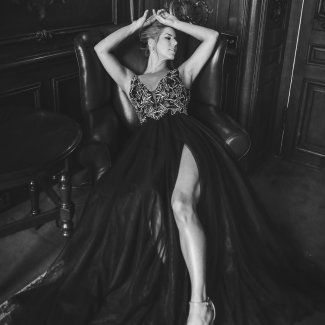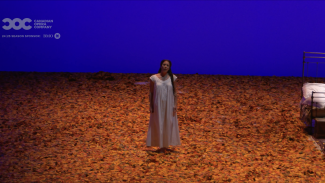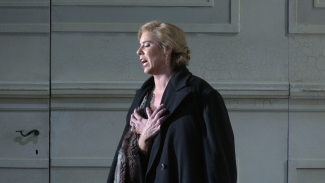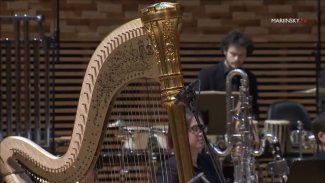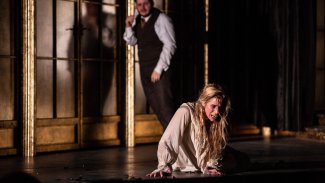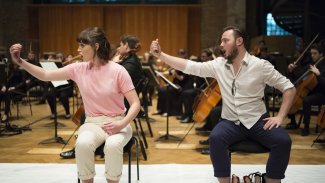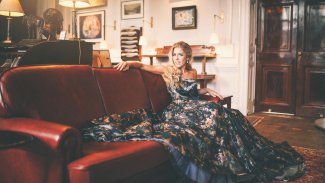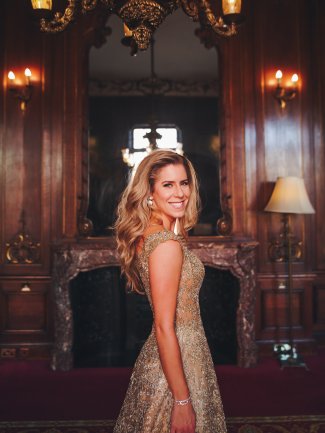

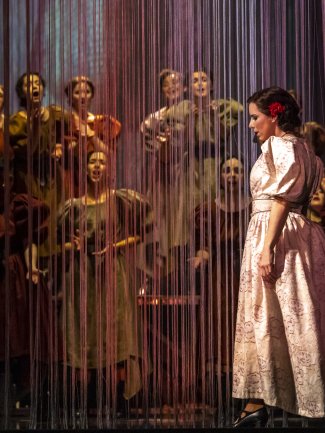
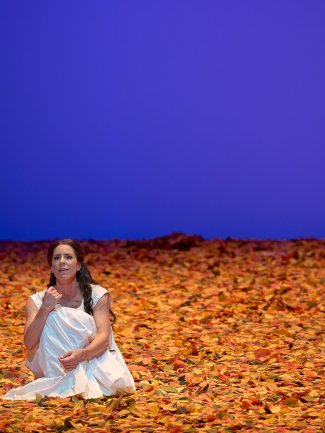
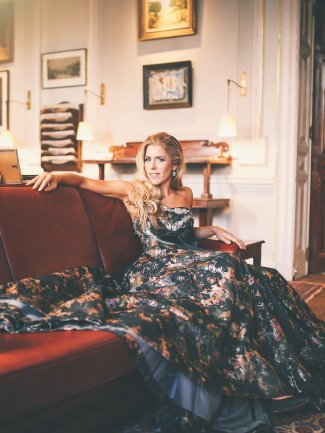
Lauren Fagan
“The voice of Lauren Fagan was thrilling, displaying remarkable control, enthralling the full-house audience.”
Bachtrack, August 2022
Australian soprano Lauren Fagan has rapidly established herself as one of her generation’s most compelling singing actresses, acclaimed for her “glossy, commanding sound” and “magnificent dramatic power.” A graduate of the Royal Opera House Jette Parker Young Artist Programme, she has returned to Covent Garden as a guest artist as Woglinde (Das Rheingold/Götterdämmerung), conducted by Sir Antonio Pappano, Gretel (Hansel and Gretel) under Mark Wigglesworth and Musetta (La bohème) under Keri-Lynn Wilson.
As part of her 2025/2026 season, Lauren Fagan is thrilled to work with Netia Jones on a new production of Rusalka for the Royal Swedish Opera, conducted by Alan Gilbert and to make an anticipated debut as Elsa in Wagner’s Lohengrin at both Klaipeda Festival and Midsummer Vilnius Festival. Lauren Fagan also returns to Sydney as Tatyana, a role that is central to her future seasons, and collaborates once again with Simone Young and the Sydney Symphony Orchestra, this time with Beethoven, Symphony No.9.
Fagan’s early promise was swiftly recognised by the major British companies: at Glyndebourne, she appeared as Avis in the first modern revival of Ethel Smyth’s The Wreckers under Robin Ticciati, followed by Helena in A Midsummer Night’s Dream under Dalia Stasevska. Other notable performances include Margarita Xirgu (Ainadamar) for Scottish Opera, Mimì (La bohème) at Opera North, and Violetta (La traviata) at Opera Holland Park, where she was praised for “mining unsuspected depths of emotion while singing the music with pearly ease” (The Times).
See more
International recognition followed with recent highlights including her debut as Komponist (Ariadne auf Naxos) in Andreas Homoki’s new production at Opernhaus Zürich, where she previously sang Giulietta (Les contes d’Hoffmann) under Antonio Fogliani and Gutrune (Götterdämmerung) under Gianandrea Noseda. Following her debut as Contessa (Le nozze di Figaro) for Canadian Opera Company under Harry Bicket, she received an immediate re-invitation as Tatyana (Eugene Onegin), conducted by Speranza Scappucci. As part of Karlsruhe’s International Handelfestspiele, Fagan was acclaimed for exceptional performances as Alcina, and she made important debuts at both Opéra National de Paris and Bayerische Staatsoper in Marina Abramović’s 7 Deaths of Maria Callas. Concertante, Lauren Fagan made her debut as Roxana (Król Roger) with Accademia Nazionale di Santa Cecilia under Sir Antonio Pappano and joined Kirill Petrenko and Berliner Philharmoniker at Festspielhaus Baden-Baden and Berliner Philharmonie as Fifth Maid (Elektra).
Representing Australia at the 2019 BBC Cardiff Singer of the World Competition, Fagan made her operatic debut as Violetta (La traviata) with State Opera South Australia, subsequently appearing with Opera Australia as Suor Angelica under Lydia Yankovskaya.
On the concert platform, Fagan’s experience spans from Beethoven’s Ah! Perfido with Sydney Symphony Orchestra under Simone Young, to Barber’s Knoxville: Summer of 1915 with Adelaide Symphony Orchestra under Dane Lam. She has sung Handel’s Messiah with Toronto Symphony Orchestra under Gustavo Gimeno, Beethoven’s Symphony No.9 with Oslo Philharmonic under Klaus Mäkelä, Vaughan Williams’ Serenade to Music at Last Night of the BBC Proms under Sakari Oramo, and Strauss’ Vier letzte Lieder in Malmö under Karen Kamensek.
Contacts
Szymon Cyganski Artist Coordinator/Administrator Shirley Thomson Senior Director, VOICE at HarrisonParrott | Head of CSR
General Management
Szymon Cyganski Artist Coordinator/Administrator Shirley Thomson Senior Director, VOICE at HarrisonParrott | Head of CSR
Shirley Thomson Senior Director, VOICE at HarrisonParrott | Head of CSR
General Management
Gallery


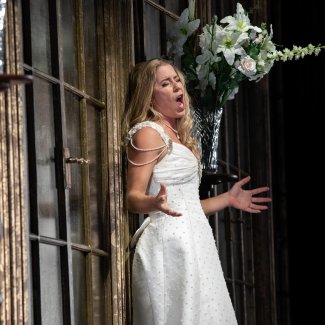
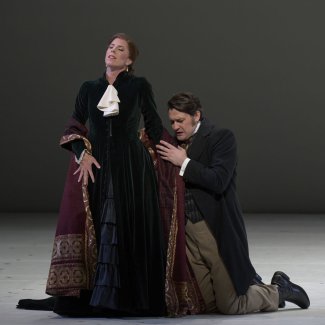
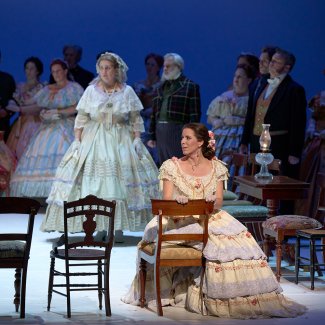
“Fagan’s absolutely possessed portrayal of Tatyana — her first time singing the role — provides an emphatic “yes.” … Carsen insists this is Eugene Onegin’s story, in opposition to the degree that Tatyana dominates both the score and the audience’s sympathy. So the seven scenes of this production orbit around the titular character. Whether she intended it or not, Fagan’s command of the stage and of her character is a resounding clapback at Carsen’s orientation.”
“Australian soprano Lauren Fagan, last in town as the Contessa in Le nozze di Figaro, is an excellent Tatyana, delivering a most affecting Letter Scene.“
“Fagan is remarkable as Tatyana…the Australian soprano’s voice is delicate yet never thin, and always exceptionally stirring, as evident from her passionate rendition of the aria from the opera’s iconic Letter Scene, in which Tatyana expresses her love to Onegin.”
“Australian soprano Lauren Fagan, making a most belated Opera Australia debut, brought the house down with her lustrous, deeply felt Suor Angelica.”
“Another Opera Australia debutante was Lauren Fagan as Angelica: her beautifully shaped lines made this an absolutely heartrending performance, the undoubted emotional highpoint of the afternoon.”
“However, it is Fagan who gives the performance of the evening. Her vocal performance is exceptional – her Senza Mamma is one of the finest operatic performances one can remember on the stage of the Joan Sutherland Theatre – and her final top notes are heart-rending. Fagan delivers them with her back to the audience, arms outstretched to the heavens, emphasizing just how hopelessly alone she is – even cut off from the sympathetic audience. When Fagan falls to her knees to scatter her son’s ashes in the earth, her anguish is truly palpable.”
“Gutrune was excellently played by the magnificent Lauren Fagan.”
“Cause of all this mayhem is Marcello’s ex-girlfriend, the outrageous Musetta, played and sung with coquettish abandon by Australian soprano Lauren Fagan – until she comes up against sober reality in Mimì’s final moments.”
“In a hairpin turn from having just sung Gretel in Hansel and Gretel at this address, Lauren Fagan’s take-no-prisoners Musetta is irresistible, having great fun with the physical comedy (watch out for the flying knickers) but also giving this good-time girl a stature she often lacks.”
“Lauren Fagan sings and performs a heartfelt Gutrune.”
“Gutrune is sung by Lauren Fagan, who has a wonderfully well-rounded voice that can also blossom, passionate and jubilant.”
“Fagan’s Helena especially noteworthy for her beauty of tone.”
“But the standout among the astonishingly talented group of performers is Fagan, who so wholly captures the essence of the Countess, drawn between the pain of betrayal and her own desires. When Fagan sings, it’s as if time stops. Her rendition of Dove sono, delivered while lying on the steps of the estate’s main hall, is achingly beautiful, imbued with pain and anger.”
“The vulnerable, though not entirely innocent, Countess Almaviva of Australian soprano Lauren Fagan in a role debut… her voice is simply gorgeous, etching the lovely long lines of her two great arias exquisitely and with great feeling.”
“Fagan’s crystalline Countess.”
“Dove sono i bei momenti, in which the Countess ponders where “the lovely moments” of her marriage went, is delivered by Fagan with touching conviction and a sonorous, bell-like tone.”
“The ladies were perhaps even better. Lauren Fagan’s Countess trod a careful line between dignified and playful and there was true pathos in her handling of the final scene. She also sang both “Porgi amor” and “Dove sono” absolutely gorgeously.”
“Margarita (Fagan) effectively carries the show, and Fagan – fresh from playing the village tart in The Wreckers at Glyndebourne – breathes tearful fervour into every gesture and phrase, scraping a dark, bitter residue of pain from her low notes. She’s tremendous, her vocal performance clearly informed.”
“Heading a trio of strong principals, Lauren Fagan was a wonderfully spirited Margarita Xirgu, her powerful soprano cutting through the music and dance, brave and determined to ensure Lorca’s legacy.”
“As Margarita (a part conceived for Dawn Upshaw), Lauren Fagan is superbly forceful in a part that reaches high both in range and in passion.”
“Soprano Lauren Fagan is the actress Margarita, singing the opening scenes with a deep chest voice but scaling gleaming heights for Margarita’s final apotheosis.”
“Fagan sang convincingly and compellingly – so believable were her singing and acting.”
“The voice of Lauren Fagan was thrilling, displaying remarkable control, enthralling the full-house audience.”
“Lauren Fagan – making her Australian mainstage operatic debut – was utterly compelling in the role. Her rich vocal tone and impressive range of colours and nuances really drew the listener into Violetta’s emotional states.”
“Lauren Fagan, excellent as always, is the impulsive, unstable Avis”
“Lauren Fagan’s bright, incisive soprano dominates her scenes”
“A large cast of whom the standouts are Karis Tucker as the rebellious wife and Lauren Fagan as her jealous nemesis”
“Lauren Fagan, returning to the cast alongside the other two 2018 principals, plays the death scene with her own dramatic freedom rather than borrowed histrionics. At home in both Violetta’s modes — as strong in the coloratura as the introverted musings — she sings luminously.”
“In Act I Lauren Fagan as Violetta is lyrical, unflamboyant yet technically accomplished, but in Acts II and III mines unsuspected depths of emotion while singing the music with pearly ease.”
“Lauren Fagan’s Violetta saw her in absolutely commanding – and extremely moving – form.”
“Fagan has truthful artistry, and strength across her generous soprano span.”
“Lauren Fagan sang Giulietta capriciously, also boldly, challengingly, as befits the figure.”
“There were some lovely veiled moments in her upper register early in the aria before she allowed her voice to unfurl in the dramatic climax, easily filling the space with her glossy, commanding sound.”
“As Simone Young told the audience the Australian singer, making her SSO debut, would have no problem projecting – and she didn’t, her rich and powerful timbre cutting through in Beethoven’s Ah! Perfido, a work which runs the range of emotions and showed why Fagan was selected for Covent Garden’s prestigious Jette Parker Young Artists Program.”
“The soloist was Sydney-born, London-based soprano Lauren Fagan, in her first professional appearance in Australia, and her warm, rich tone, combined with effortless control, brought out the delightfully wistful character of Agee’s prose in Samuel Barber’s Knoxville: Summer of 1915.”
“The quality of the vocal performances is superb. Lauren Fagan, as the doomed Mimi, gives a gorgeous rendition of ‘Si, Mi Chiamano Mimi’, shortly before duetting with Eleazar Rodriguez on a moonlit ‘O Soave Fanciulla’ that proves to be one of the highlights of the evening.”
“Lauren Fagan’s Mimì was beautifully sweet, delicate and restrained, but unleashed torrents of powerful emotion, a fact evident from the moment she joined her new lover Rodolfo for ‘O soave fanciulla.’ She was thrilling.”
“Rising young star Lauren Fagan dazzles as Alcina. Her laments, and in particular the “Mi restano le lagrime”, are literally gilded in gold, her voice can display pain incarnate, while also asserting powerful nobility and a superb helplessness.”
“Fagan was a convincing sorceress from the very start, with a strong rich soprano, inducing sympathy in “Ombre pallide” as her shades desert her, spitting venom in the trio “Non è amor” and finally collapsing as all conspire to defeat her.”
“As Alcina the gorgeous soprano Lauren Fagan convinces again, completing her six (!) bravura arias between despair and rage, rapture and revenge, with breathtaking, truly magical virtuosity; and in her art of frenzied coloratura, crazy flights of fancy, elegant arcs and daring leaps, demonstrates boundless skill.”
“The three Norns were led by the authoritative Lise Davidsen, the three Rhinemaidens by the shining Lauren Fagan.”
“Fagan, one of today’s finest young sopranos, is exceptional throughout and a superb actor. Her tone blazes with existential defiance and desperation, and she possesses both the agility for act one – Sempre Libera is capped by a dazzling top E flat – and the dramatic weight for the closing scenes.”
“Luckily, these opening moments also reveal that in Lauren Fagan this new production has a Violetta of considerable force, plangent tones and solid dramatic instincts.”
“the easy grace of Fagan’s coloratura, the warmth and richness of her sound, and her delicately floated high notes, all make this Violetta a delight.”
“More than just technical precision though, Fagan’s performance embodied Violetta’s tragedy and nobility, phrases soaked with emotion which matched the quality of her acting. Fagan alone makes this production worth seeing.”
“Lauren Fagan was on commanding form as both actor and singer, and she looked sensational and vulnerable in her fin-de-siècle gowns. Her coloratura in ‘Sempre libera’ was light and secure, her Act 2 scene with Germont père, showing off a fine control of tone and hushed dynamics, was done with considerable restraint, and her death scene faltered and faded very movingly.”
“the Australian soprano Lauren Fagan made a vivid, sensitive Roxana.”
“Lauren Fagan encompassed repressed stillness and seething passion as Agnès, retaining her precision of attack and creamy tone at even the most exposed high climax”
“As for Lauren Fagan, playing the humiliated wife for whom a taste of real love catalyses her one act of defiance, she achieves a small miracle: dispelling memories of how Barbara Hannigan sang and acted in the premiere. Fagan delivers a fiercer, less enigmatic characterization.”
“Most thrilling of all, Lauren Fagan’s gleaming, intense performance showed what a extraordinary dramatic creation the character of Agnès is, one of the great operatic heroines of the past 100 years.”
“Do not miss the excellent performance offered by all artists – with particular acclaim for the great vocal charm of soprano Lauran Fagan (Roxana)”
“Australian soprano Lauren Fagan sang a commanding Donna Anna with dramatic recitatives, laser-like projection and clean fioritura. “Non mi dir” was the highlight of the evening”.
“Of the other ‘bohemians’, Lauren Fagan’s Musetta had an engaging brassiness of voice and manner in the Café Momus scene (which was well realized theatrically) and a very different, but equally engaging, capacity for deeper emotional involvement in Acts III and (especially) IV. More than some more famous singers in this role, she made one believe in the character’s generosity of spirit in the last Act.”
“Lauren Fagan was a brilliantly wild and flighty Musetta, until the final scene where the Carmen-like mask dropped and the softness of the woman beneath was movingly revealed. Her powerful voice, with remarkable control, even at the peak of her range, mellowed beautifully by the end.”
“In the second half Vaughan Williams’s Serenade to Music provided the unique sound of 16 solo singers – as distinct from a 16-part choir – of whom Lauren Faganstood out in a high quality crowd.”
“Lauren Fagan shone as Gounod’s Mireille… Her stunningly rich tone and vibrant timbre rose above the incongruous design and later, as Mimì, she showed that she has range of colour too.”
“Lauren Fagan excelled as Gounod’s Mireille, her creamy tone, fast vibrato and clear top perfectly suited to French repertoire”
“contrasted with the bright ring of Lauren Fagan’s Sister Genovieffa, surely an Angelica in waiting”
“His daughter Lila, our heroine, gets a spirited and joyful incarnation from Lauren Fagan… her soprano warm and crystal clear.”
“…Lauren Fagan as his love-interest, Leila, [was] simply superb. She slinked around with perfumed exoticism as the beautiful young princess and he could barely contain his passion for her… These two fine singers proved they were worthy of headlining any Pearl Fishers cast and deserved the prolonged ovation they received.”
“The positively angelic Léila of Lauren Fagan”
“Fagan had a lovely silvery sheen to her soprano as Léïla pleaded for Nadir’s life, fuelling the flames of Zurga’s jealousy. Sparks flew!”
